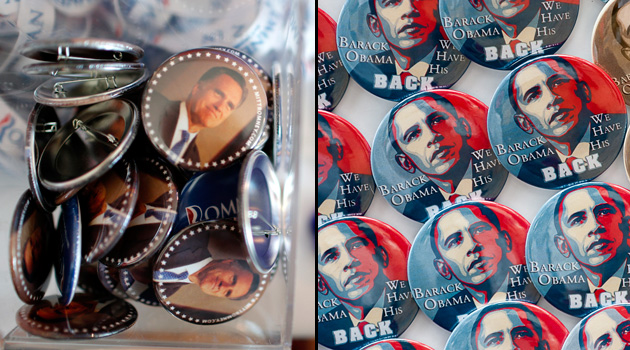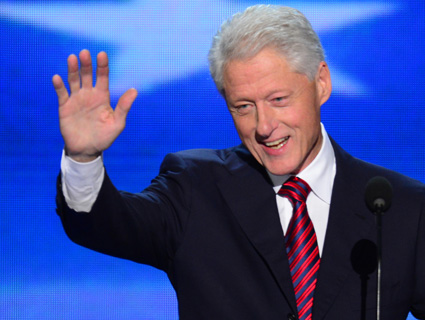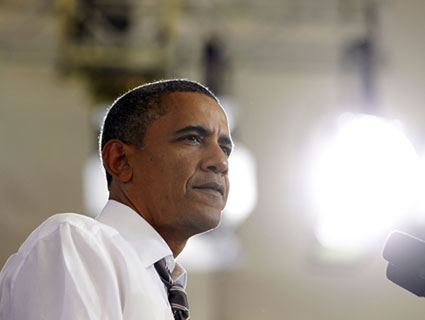
Romney pins: Edmund D. Fountain/Tampa Bay Times/Zuma; Obama pins: Sean Meyers/Zuma
Not too far from the Time Warner Cable Arena in Charlotte, a local art gallery is featuring an exhibit called “Divided State of America,” but it’s not necessary to trek to this space to contemplate the deep divisions within the nation. You need only spend a few nanoseconds at the Democratic presidential convention, after experiencing a week at the Republican gathering in Tampa, to realize you have left one reality for a much different one. And this goes far beyond policy positions and political stances.
Here’s a brief guide:
The people. It’s rather obvious: Planet Democrat is inhabited by people of different colors; Planet Republican is monochromatic. This stark contrast has long existed and is not a surprise. (One recent poll showed Mitt Romney with zero—yes, zero—support among African Americans.) Yet shifting from Tampa to Charlotte is not unlike the moment in The Wizard of Oz when black-and-white gives way to the full spectrum. In Tampa, it seemed there were more black and Latino Americans on the stage than among the audience of thousands of white people. The streets of downtown Charlotte—which, for some reason, is called “uptown”—are overflowing with diversity.
And this extends beyond race. The thousands of delegates in Charlotte represent more income (or class) diversity. Sure, plenty of well-heeled Democratic donors, lobbyists, and supporters are strolling about, but there are many folks who look as if they are heading back to tough jobs when the convention is done: teachers, nurses, Teamsters, and the like. In Tampa, I conducted an experiment and asked several journalists to fill in this blank: “These Republican delegates look like they come from ________.” The most common answer: “a country club.” Another reply: “a gated community.”
The street. Tampa was an antiseptic affair. The arena was in a security area that resembled a Green Zone. Delegates were bused in, then bused out. With scant interaction between the convention and the rest of the world, no sense of community was created. It was as if the GOP delegates were suburbanites—or exurbanites—commuting to and from their place of business, zipping past the locals and their neighborhoods. In Charlotte, the delegates and others have flooded the downtown area, walking from one event to another, interacting with one another, the residents of the city who have flocked to the city’s center, and even the street-corner anti-abortion protesters. There’s a vibrancy that embodies the best values of community and urban life.
The past. On Planet Democrat, memory exists. In Tampa, there was a dark hole. At Mittfest, barely any mention of George W. Bush or his presidency occurred. History began the day President Barack Obama took office (with the exception of Paul Ryan claiming Obama was responsible for the closing of a GM plant that shut down before Obama assumed office). There was no talk of what had caused the economic collapse that still reverberates. Instead, Obama’s post-collapse actions were held responsible for the ongoing woes precipitated by the Bush-Cheney crash. Tribute was indeed paid to Ronald Reagan, but all Republican policies and actions since 1988 were photoshopped out of the picture. It was very Soviet—as was the Republican revisionism that erased Mitt Romney’s signature policy accomplishment as Massachusetts governor: implementing comprehensive health care reform.
Democrats are suffering no such amnesia. They embraced and celebrated Bill Clinton, who delivered perhaps the best ex-presidential speech in decades. It was a bravura performance that integrated the past (his) and the present (Obama’s). In his most charming manner, he deftly argued the case that the Republicans’ previous policies and actions are a prologue for a dark and dangerous future, should Romney win. Clinton turned history into ammo.
The ladies. In Tampa, Ann Romney had a double challenge. As the Romney campaign’s emissary to women, she first had to convince women voters that though she hails from the highest rungs she still understands the economic difficulties they confront daily, and then she had to persuade them that because Mitt Romney is a swell guy (who once safely walked her home from a high school dance!) he deserves their support. In her speech to the Democrats, Michelle Obama didn’t have to plead a case; she only had to tell her story. Her connection to working women and struggling families is based on her own past; it has a more authentic foundation.
Why they’re here. It’s tough to generalize about the attitudes of large crowds, but let me try. At the Tampa arena, many GOP delegates oozed entitlement and privilege. When Ann Romney proclaimed, “This is our country”—and the crowd cheered—it didn’t come across as a moment celebrating inclusion. And there were few expressions of support from the GOP stage for the least fortunate in American society. The Republican convention presented no speakers who needed help, except for a few business people who claimed their companies had been injured by Obama administration policies (even though several had benefited from government contracts). The Democrats have featured citizens who were in dire need of assistance, most notable among them was Stacey Lihn, the mother of a young daughter with a congenital heart condition who would not receive critical medical treatment were it not for Obamacare. The Republican convention ignored such Americans.
There have been other differences. In Charlotte, much more campaign swag has been for sale, with more entrepreneurial street hawking than there was in Tampa. The music in Dem-land (John Legend, Common, Jeff Bridges, James Taylor, the B-52s, the Warren Haynes Band) has been much closer to what you find in the real world than the musical fare at the GOP convention (Journey—that is, Journey without its original lead singer).
It’s unclear how much the political conventions matter. Romney’s afforded him no bounce—especially after Clint Eastwood’s improv stole the show. And at the Democratic convention, much of what happens will not reach those undecided voters—now estimated to be 4 percent of the electorate. These voters don’t pay great attention to such events. Only Bill Clinton’s speech and Obama’s acceptance address have the potential this week to influence impressions within this small voting bloc. The conventions were largely designed and programmed to rev up the respective base and the donor community for each of the parties. But they do tell a tale, and it’s a story of starkly dissimilar visions of the American experience.







